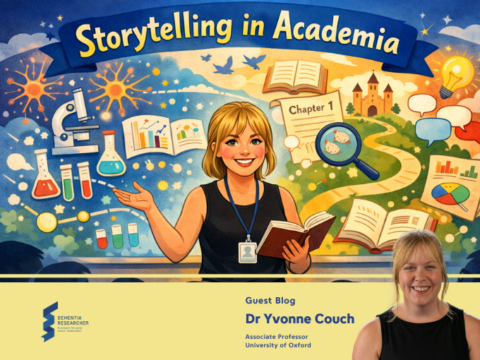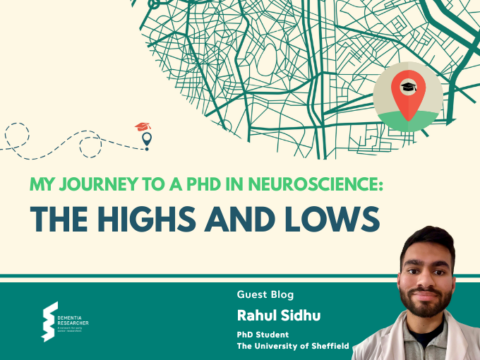I’ve been to a couple of conferences lately, and it has got me thinking about whether my environmental footprint in academia is where I’d like it to be. The conferences I go to tend to be UK-based, via train, but am I limiting my progress in science by questioning whether I should be going to those that happen outside of the UK, for reasons unrelated to the science itself?
I know, I know. Climate chat is everywhere you turn, and now it is even on the pages of Dementia Researcher. It’s inescapable for a reason though, and that reason is what brings me here, with this month’s blog. You might be questioning the relevancy of environmental concern to your day-to-day academic experience, and the world of dementia research, and that’s totally fair. Institutions have far more responsibility and capacity for change – I don’t write this to guilt any individuals, but rather to note my own reflections in hopes they may resonate with someone reading this. In actuality, I write it a bit begrudgingly, knowing that travel is one of the more fun bits of academia, and also the thing most easily pointed to when we start to talk about our environmental footprints. Bluntly, it is also a bit of a nerve-wracking topic – as an Early Career Researcher, it can often feel tricky to discuss loaded topics, and (understandably) easier to “keep the peace”, particularly when career trajectory and financial support may feel linked to more than just your scientific merit alone. However, this topic feels important, and I’ve spent a lot of time guilting myself in this space, despite my career stage making my options for pushing for change somewhat limited. If being outspoken about my experiences in academia thus far has taught me anything, I won’t be the only one experiencing this. So, here we are.
Academia is a behemoth, but I was far into my academic career when I discovered just how much of a behemoth. I entered academia being like “of course all academia cares about is science and providing as definitive results as possible so that we can make things better for people, right?…Right?!” Then, I found out that the academic publishing industry is pretty much an oligopoly[1, 2, 3] worth at least $19 billion annually [4] – putting it in similar leagues to both the music and movie industries. Colour me incredibly surprised, this wasn’t the expectation I had! Then fast-forward several years where – love them or loathe them – various environmental activist groups (alongside many natural disasters) have positioned climate change at the forefront of global discourse. But surely, surely, this shouldn’t affect my beloved academia, right?..
We might as well start with the mainstay of the academic world – article publication. Many big publishing companies have journals, or publish articles, on climate change-related topics, whilst simultaneously publishing work in mining and engineering which uses non-sustainable methods. As an example, ExxonMobil has been accused of having a decades-long role in climate change denial [5], yet work pertaining to this was published by reputable and prominent scientific publishers. Publishing both things could be seen as a balanced view, but with the stark nature of the climate situation abundantly clear, and the near-global drives to reduce carbon emissions, justification for this is more and more difficult. Specific publishers are also being specifically called out, for example Elsevier is currently the subject of a movement called #StopElsevier (https://stopelsevier.wordpress.com/) because of their documented relationships with the fossil fuel industry. You can do what you like with this information, but in case you find it relevant, this link contains details as to actions you can take if you so wish. Ultimately, nearly all major publishers have signed some form of pledge to get to net zero or take action on climate change (see, for example https://publishingdeclares.com/home), but I don’t think it is unwarranted to question if they are doing enough to that end. I’ll leave that to you to make up your own mind.
This is by no means an exhaustive list of what is going on in this space, nor are these the only entities involved, but it is an example that I find illustratively useful to examine my own conflicts – I find the sheer scale of both the academic publishing and fossil fuel industries somewhat incomprehensible, but what I will say is that for me, this coupling up of two behemoths makes me feel smaller and more insignificant than anything else in the academic world, which is a bit of a double-edged sword. It makes me feel like I can’t do much, a feeling that is compounded by my ECR status, but also there’s some comfort (at least when I succeed in having a positive attitude about things) to the guilt I feel about my own hypocrisy that comes from knowing that the things I do are far more inconsequential than what these behemoths could do.

A single return flight from London to New York emits about 986 kg of CO2 per passenger, which is almost as much as the average person in the EU emits in two months.
Universities are where much of the critique around the climate impact of academia are levelled. Some of that is very much warranted, with some institutions churning out papers evidencing the impact of climate change whilst things continue to be ‘business as usual’ [6], whilst some professors have been shown to be travelling >33,000km/year [7]. Some research topics of great current interest, such as AI, are resource-heavy and computationally intensive [8], but may also help us to improve upon our sustainability efforts in future [9]. Indeed, it’s not all doom and gloom. There is actually an abundance of schemes in universities across the UK (and globally too), with tight and on-target goals for net zero carbon emissions (without offsetting), recognising their influence in the cities they’re part of and supporting the wider population in sustainability efforts, reforesting schemes, and developing frameworks for greater sustainability and efficiency standards for laboratories (the Laboratory Efficiency Assessment Framework, or LEAF), as examples. Another initiative I really like out of UCL is the Easter Switch Off, which is exactly what it sounds like, but makes me more mindful of my energy usage throughout the year.
Of course, one of the big contributors is conference travel, but some universities have started banning domestic flights (and those in Europe where taking the Eurostar is possible). Sustainability is coming more and more to the forefront of concerns in the conference world too, with us learning from COVID that attending a conference remotely is both feasible and enables greater inclusivity. Some conferences are also making their own sustainability statements, for example Alzheimer’s Research UK and their 2023 statement. But, on a whole, we remain somewhat hypocritical, telling others to do as we say but not as we do [10], as we fly off to an international conference somewhere. A prime example of this from my own backyard was the COP26 conference in Glasgow, which everyone flew in for (some even bringing their motorcades with them), despite it being, you know, a climate change conference…
I do have empathy to this situation – this is a really messy area and the expectations of academia mean that as individuals we end up in hypocritical situations far more than I’m sure any of us would like. But, as an extreme hypothetical, are we just supposed to ignore this massive elephant in the room until there is no room, and indeed no world, in which to publish? The ‘No Music on a Dead Planet’ movement – which brings together musicians and music fans to take action on the climate situation – has gained a lot of traction, is it time for something similar in academia as a whole? As someone who has witnessed huge changes in the world of EDI just in my time of being in academia, including many grant applications now requiring inclusivity statements, I don’t think it is that much of a jump to start making similar environmental statements mandatory, if for no other reason than to foster greater transparency around the topic.
So, what exactly do I do, to play my part as an Early Career Researcher? Honestly, there are very few tangible things which we can do truly by ourselves. However, we can contribute to a critical mass, the impact of which can be huge. When it comes to our institutions, we can press for more environmentally-friendly methods of travel – although flying is quickest, when you compare the related admin with the additional time on a train, it is often negligible. If you’re in the north of England, do you really need to fly to the central belt of Scotland? When it comes to journals, I can fully understand why it may feel impossible to do anything, and I think this is a valid standpoint as an individual researcher, particularly when at the early career stage. However, if you are in a position where you are comfortable enough to take action, there’s a variety of things you can do; refuse to review for them, don’t publish with them (I know this is easier said than done, again it’s about what is practicable and career stage plays into that), write to the editors, and report any greenwashing activities.
Now, lets return to my original thesis, which feels like a lifetime (or more just many words) ago – am I limiting my scientific progress by considering my environmental impact extensively? What I have discussed here is clearly not exhaustive, from either side, and as is often the way with things like this, reaching some sort of ultimate summary conclusion isn’t easy. I circle back to the very argument I started with; institutions have far more power to make change than a singular person does, but individual people in combination is what creates a movement, and a movement is what’s needed to change the tide. However, as an individual in academia, it’s quite the tide to turn when it feels like your very position in the field is on the line. Nevertheless, there are initiatives that we can all take part in, and although these aren’t flawless, they do make a difference.
But when it comes to bigger institutions and the publishing world, they have the power to contribute massively to this change, and many are not doing so but also publishing work that highlights the pressing nature of climate change. The cognitive dissonance is clear, and we are all experiencing it. Ultimately, where I’ve reached in my own journey is that it is about what is doing what is practicable for me and my career stage. Maybe I’m wrong (and I am very open to any conversation that results from this post) but the best I can do is try to take the most environmentally-friendly route to a conference – or attend online when there is no clear gain to in-person attendance – and to take part in any initiatives for the good that are viable for me in my current circumstances. I think that is all us ECRs can do, but that doesn’t make it pointless, and the more of us who do it, the more of an impact it has.
[1] Puehringer, S., Rath, J. and Griesebner, T., 2021. The political economy of academic publishing: On the commodification of a public good. Plos one, 16(6), p.e0253226.
[2] Racimo, F., Galtier, N., De Herde, V., Bonn, N., Phillips, B., Guillemaud, T. and Bourguet, D., 2022. Ethical publishing: how do we get there?. Philosophy, Theory, and Practice in Biology, 14, p.15.
[3] Larivière, V., Haustein, S. and Mongeon, P., 2015. The oligopoly of academic publishers in the digital era. PloS one, 10(6), p.e0127502.
[5] Supran, G., Rahmstorf, S. and Oreskes, N., 2023. Assessing ExxonMobil’s global warming projections. Science, 379(6628), p.eabk0063.
[6] Thierry, A., Horn, L., Von Hellermann, P. and Gardner, C.J., 2023, October. “No research on a dead planet”: preserving the socio-ecological conditions for academia. In Frontiers in Education (Vol. 8, p. 1237076). Frontiers Media SA.
[7] Arsenault, J., Talbot, J., Boustani, L., Gonzalès, R. and Manaugh, K., 2019. The environmental footprint of academic and student mobility in a large research-oriented university. Environmental Research Letters, 14(9), p.095001.
[8] Dhar, P., 2020. The carbon impact of artificial intelligence. Nat. Mach. Intell., 2(8), pp.423-425.
[9] Van Wynsberghe, A., 2021. Sustainable AI: AI for sustainability and the sustainability of AI. AI and Ethics, 1(3), pp.213-218.
[10] Higham, J. and Font, X., 2020. Decarbonising academia: Confronting our climate hypocrisy. Journal of Sustainable Tourism, 28(1), pp.1-9.

Jodi Watt
Author
Dr Jodi Watt is a Postdoctoral Researcher at University of Glasgow. Jodi’s academic interests are in both healthy ageing and neurodegenerative diseases of older age, and they are currently working on drug repurposing for dementia. Previously they worked on understanding structural, metabolic and physiological brain changes with age, as measured using magnetic resonance imaging. As a queer and neurodiverse person, Jodi is also incredibly interested in improving diversity and inclusion practices both within and outside of the academic context.

 Print This Post
Print This Post






This blog post brings up a critical discussion about the intersection of academia and environmental impact. It’s refreshing to see such honesty about the challenges and hypocrisies we face in balancing our professional responsibilities with environmental concerns. As an Early Career Researcher, it can feel daunting to push for change, but every small action contributes to a larger movement.